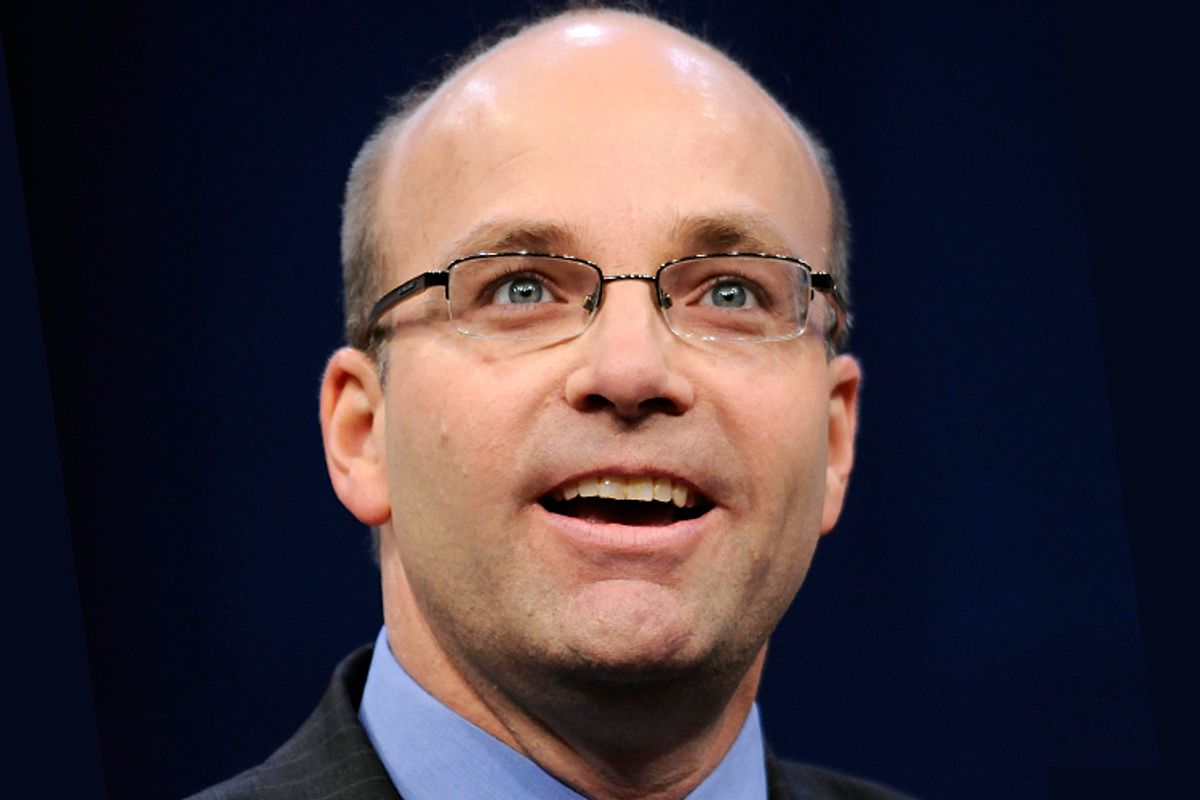The Washington Post's Erik Wemple, for some time now the most entertaining Politico critic in the capital region, wrote a blockbuster story about Mike Allen, the superstar author of Politico's Playbook, a daily newsletter that various important Washington people are obsessed with for some reason. Wemple's well-researched dive into Playbook basically confirmed what a more casual reading of the tip sheet suggests: Allen is very, very generous to his advertisers.
The piece specifically homes in on Allen's multiple instances of outright shilling for the U.S. Chamber of Commerce, a conservative business lobbying group that frequently sponsors Playbook. Allen publicizes their events, prints their press releases, and plugs their campaigns.
Wemple cheekily refers to this as "native advertising," another term for, basically, sponsored content -- advertising designed to look like editorial product. The implication is that Allen is shilling for his advertisers and disguising it as news. But what Allen is doing isn't straight-up pay-to-play. It's not a quid pro quo arrangement in which Allen adopts certain opinions or spreads certain news in exchange for advertising money. Allen doesn't need to be bribed to think that the U.S. Chamber of Commerce's conference calls are big news -- he just thinks they're big news. When Allen shilled for "Fix the Debt" right before they sponsored Playbook, I'm sure that wasn't as nakedly transactional as it appeared. Instead, I think Allen thinks Fix the Debt is important, worthy of coverage, and basically fighting for a noble cause.
It's "cognitive capture," or whatever else you call the system that has led to our entire elite political class all believing things that happen to line up perfectly with the desires of a few profitable industries. Just as politicians don't explicitly need to be bribed with campaign contributions to do things that benefit the groups and companies that contribute to them. They're usually already convinced that whatever these interests want is what's best for everyone.
Allen considers press releases from organizations he covers to be plainly newsworthy in their own right and therefore worthy of passing on to his readers because he's engaged in trade journalism -- reporting on a sector for that sector, not for a general audience. You wouldn't expect Ad Age to suddenly become adversarial toward the advertising industry, would you?
I imagine most other Politico journalists don't consider what they do "trade journalism" for the business lobbying industry. But that's what Allen and his bosses consider good political journalism -- it informs members of the Washington power elite what other members are up to. Politico didn't cooperate with Wemple's piece, and it definitely won't respond to it, because there's absolutely no ethical issue involved here, in Politico's eyes. You're not Allen's audience! If you want actual reporting, read one of the rags aimed at people who don't wield power on Capitol Hill or K Street.
It's not strictly trade journalism, of course, because a trade journalist might quietly think that the industry she's covering is immoral or full of hypocrites and villains. That's decidedly not the case with Allen, who is notoriously chummy with his sources. Allen believes, very deeply, in the business elite consensus. He just doesn't consider that to be a "political position" as we would define it. This is what annoys and confounds people about Allen and his place in political journalism. He doesn't act remotely like a real journalist, because he's not. He's an advocate journalist masquerading, poorly, as an old-fashioned political reporter. And, yes, during election season he does (very bad) conventional political analysis, but his primary gig is sincere advocate for the interests of a certain class of major corporate lobbyists and their allies. He never tries to hide his sympathies, he just for some reason feels compelled to retain the "objectivity" mask of a traditional big media reporter.
What annoys people about "media bias," I think, is less the bias itself than the effort to cover it up -- to say it doesn't exist at all, as if anyone were truly capable of harboring absolutely no feelings about how America should be governed. In Washington, today, we have this bizarre situation where a certain explicitly political, broadly pro-business worldview is so commonly accepted among the elite that it doesn't "count" as ideology anymore, and objective journalists feel free espousing it without violating their sacred code of nonpartisanship. Some people have more specific political agendas that are obvious in their work, and their refusal to just admit to these agendas makes their work dishonest. Mike Allen should drop the objectivity pretense and just openly write his little newsletter, and his occasional columns, as an advocate. Activist journalism is just as good as the old-fashioned kind if it's honest.
Mike Allen, just give in and admit that you're a tool of the U.S. Chamber of Commerce, and BP, and Pete Peterson, and all the other power players in your weird little echo chamber. It will make everyone feel better about you.



Shares